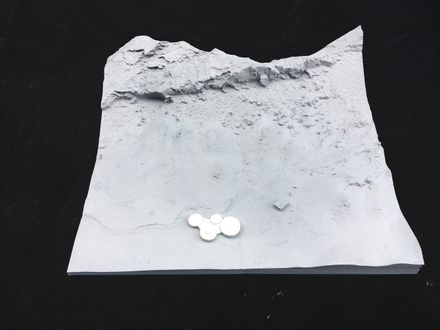
The Buhais Geology Park Interpretive Centre
ARCHITECTS
Hopkins Architects
PHOTOGRAPHS
Marc Goodwin
LOCATION
Sharjah, United Arab Emirates
CATEGORY
Exhibition Center
MANUFACTURERS
Interface, Jotun, Knauf, Rak ceramics, Abood Saeed Mubarak, Akinco, Al Rathath Insulation, Composure, El Barza, Exceed Precast, ID360, Jenmars Group, MARF Steel, Motive Industries, Powerline Materials Est., Regions Trading, Solera LLC
CONSULTANTS
De Leeuw (Cost Consultant), Design Confidence (Fire Consultant), Gillerion Scott (Acoustic Consultant) Lux Populi (Lighting Consultant)
ENGINEERING
GAJ (M&E Engineer), eConstruct (Structural Engineer)
YEAR
2020
CLIENT
Hana Saif Al Suwaidi, Sharjah Environment and Protected Areas Authority (EPAA) with HH the Ruler’s Office
COLLABORATORS
Ralph Applebaum Associates (Exhibition Design)
LANDSCAPE
Spencer
Text description provided by architect.
Hopkins Architects has completed The Buhais Geology Park Interpretive Centre, which was officially opened by His Highness the Ruler of Sharjah. The Park lies approximately 30 miles (50 kilometres) south-east of the city of Sharjah in a region of exceptional prehistoric and geological significance.
The site features an abundance of marine fossils from over 65 million years ago, spectacular mountain ranges and ancient burial sites from the Stone, Bronze and Iron Ages.
Seeking to create a series of exhibition spaces which vividly present the region’s significant geological phenomena – including deep earth structures, plate tectonics, geomorphology and sedimentation – Hopkins Architects has designed five interconnected pods of varying sizes.
These accommodate exhibition areas, an immersive theatre, a café offering panoramic views of the dramatic Jebel Buhais ridge rising some 100 metres above, a gift shop and other visitor facilities.
The geometry of the pods was inspired by the fossilised urchins present on-site and developed into a typology which could be sized to suit the Centre’s different functions.
To minimise disruption to the existing fauna, geology and terrain, the pods were designed as prefabricated concrete structures and only lightly touch the ground on in-situ reinforced concrete foundation discs. A sixth, unconnected pod is used as a service building.
The pods are clad in steel panels, coloured to reference the different hues of the surrounding landscape as well as to shade the precast concrete structures.
These panels are fixed into an array of steel ribs, giving the pods their distinctive sculptural, cantilevered forms and further referencing the exoskeleton of the urchin fossils.
In some pods, glazing and oculi have been inserted to control natural light into space, tempering the brightness of the desert sun.
Linking the pods and looping sinuously around the site is an outdoor trail accessed from the main exhibition area.
This trail – designed to encourage visitors to explore the jebel (Arabic for mountain) – incorporates viewing areas, a classroom shaded by a high-tensile canopy and raised walkways across natural rock formations and ancient burial grounds.
Using a series of model-based interactive displays, the Centre explores the region’s mountains, sand dunes and the Arabian Gulf as dramatic evidence of the area’s rich tectonic history over time – in particular.
The disappearance of an earlier ocean and the creation of the limestone mountain ranges of Jebel Buhais. Visitors and researchers can actively examine local rocks and fossils.
The Geology Park is the latest addition to a suite of learning centres operated by Sharjah’s Environmental Protected Areas Authority who lead conservation efforts in the Emirate, manage protected areas and provide exceptional educational experiences.




































